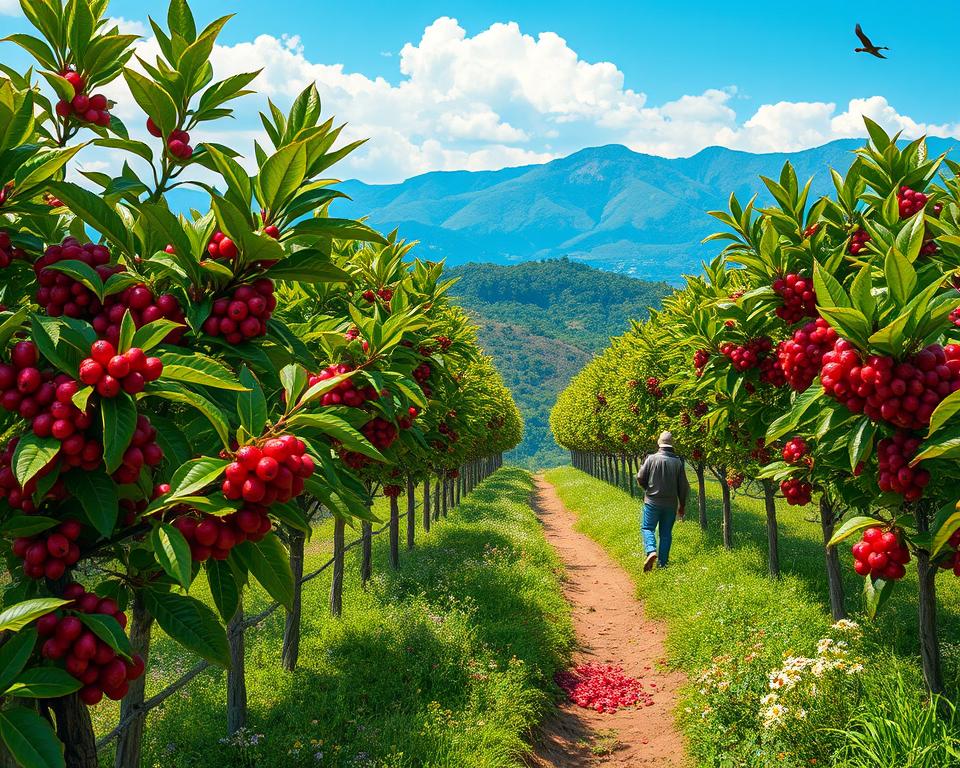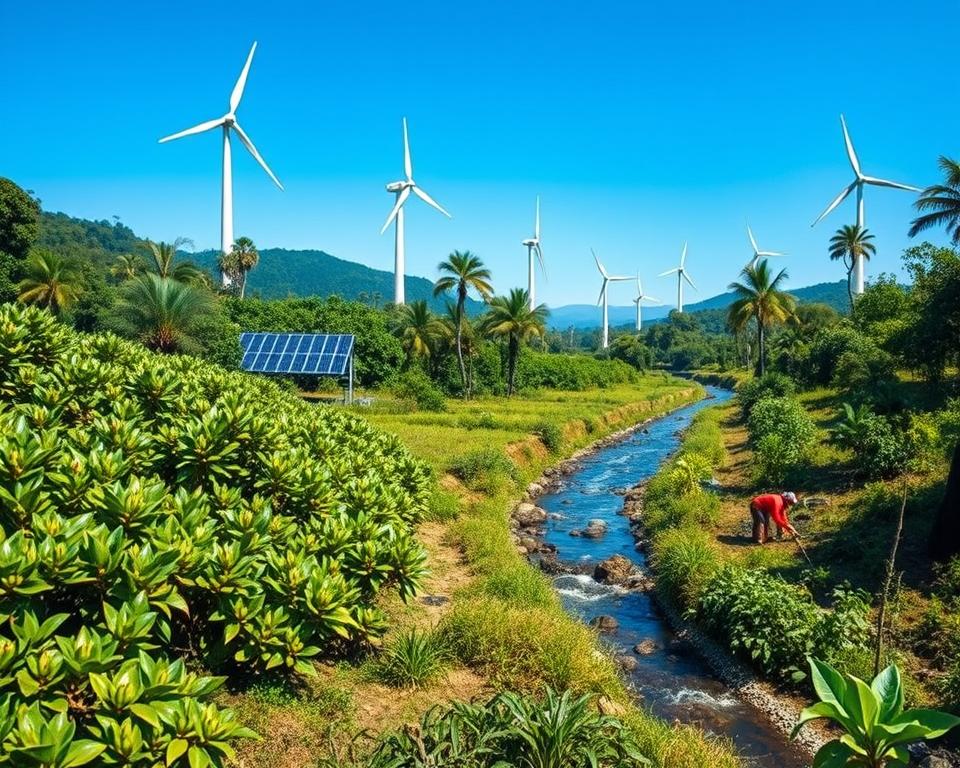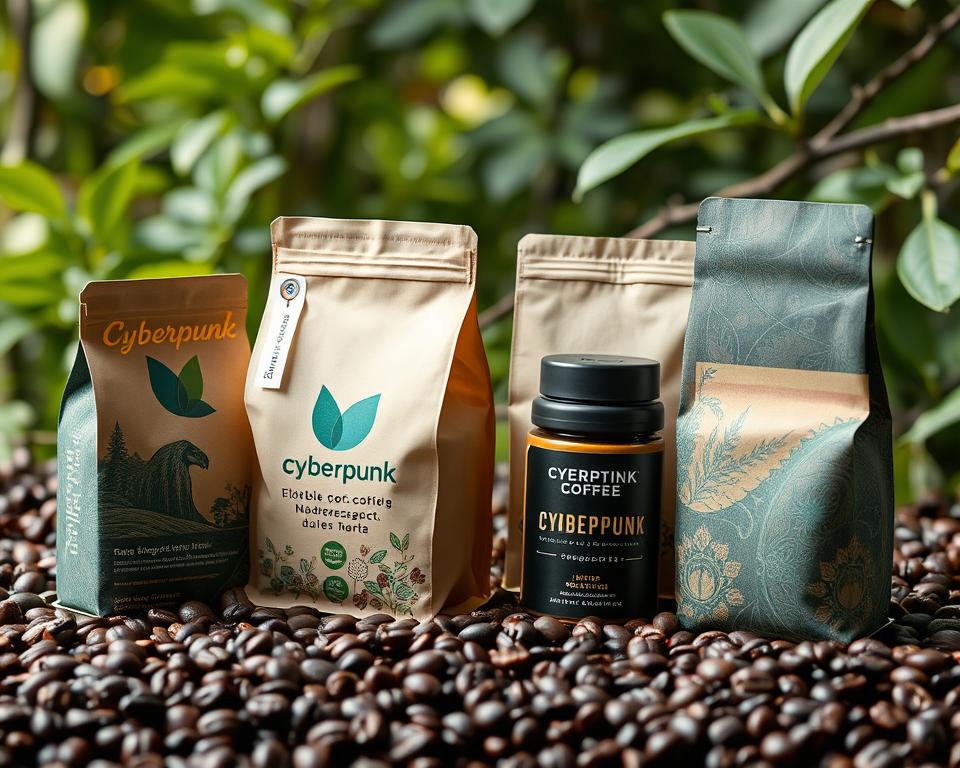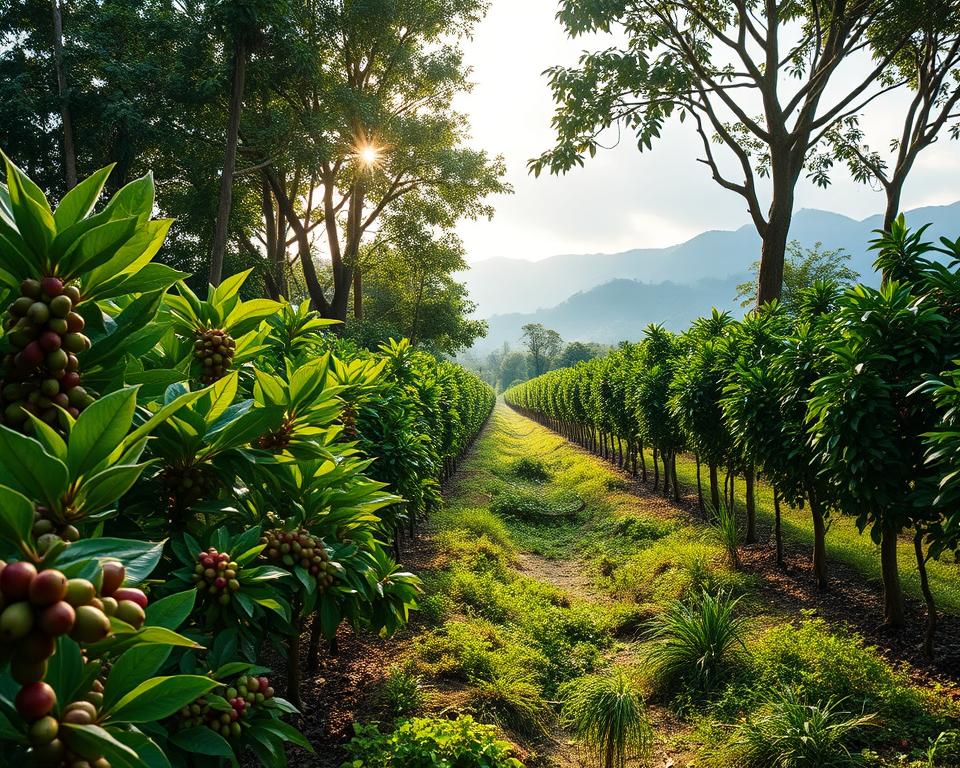As you browse the coffee aisle, you’ll see different coffee labels. These include Fair Trade, Organic, and Rainforest Alliance. Have you ever thought about their significance?
These ethical coffee certifications tell us about the agriculture and trade practices of your favorite coffee. They ensure environmental sustainability, social responsibility, and economic fairness. By picking certified coffee, you’re not just getting a delicious drink. You’re also making a choice that benefits the world.
Companies like Artisan Coffee Co. and Hamlet Coffee Roasters sell coffee with these important certifications. This means they provide not only top-notch beans but also peace of mind. Through ensuring fair pay for farmers or advocating for sustainable coffee practices, these labels make a real impact.
Certified coffees are available in over 50 countries, mainly in the equatorial coffee belt. This includes leading producers such as Brazil, Colombia, Ethiopia, Indonesia, and Peru. Arabica beans, making up 60-70% of the coffee sold, often have higher prices. This is because of the premiums paid to farmers and the costs of certification.
Certifications bring transparency and accountability to your coffee purchase. They turn a simple choice into a meaningful one. Let’s support a more ethical and sustainable coffee culture together!
What Are Coffee Certifications and Why Do They Matter?
Coffee certifications ensure your coffee is made ethically and sustainably. They aim to improve the coffee industry by focusing on the environment, society, and economy. These certifications matter for the health of our planet and fairness in trade.
Environmental Sustainability
Certifications like Organic and Bird-Friendly help protect our planet. They encourage methods that save biodiversity and ecosystems. This helps coffee grow in harmony with nature.
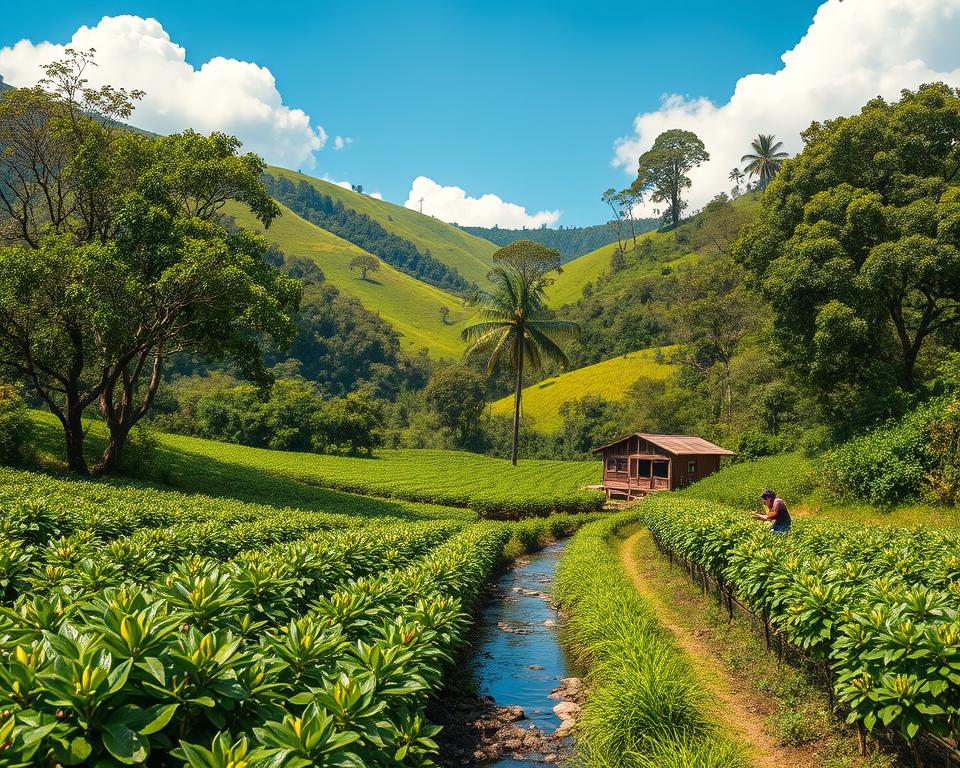
Over 50 countries grow coffee near the equator. But only coffees scoring 80 or above are top-grade. Many roasters offer these organic choices. They skip harmful chemicals to boost soil health and cut harmful effects on our planet.
Social Responsibility
Certifications also ensure that coffee workers are treated well and paid fairly. The Rainforest Alliance, for example, looks out for worker rights. They aim to make lives better for those in the coffee industry.
Certified coffees respect these important standards. The Rainforest Alliance, active since 1987, is well-known for caring about workers and the environment. They are a big name in North America and Europe.
Economic Fairness
Fair Trade helps make sure coffee farmers are paid properly. Started in 1988 in the Netherlands, it’s a big deal in ensuring fair pay. It has grown a lot in North America and Europe.
This certification means farmers get fair prices, helping communities grow. Certified coffees do cost more, but they lead to better stability and growth. And now, more people want these coffees, driving up demand and support for ethical, sustainable coffee.
Fair Trade Certification: Supporting Coffee Farmers
Fair Trade coffee certification uplifts farmer livelihoods and ensures ethical buying. 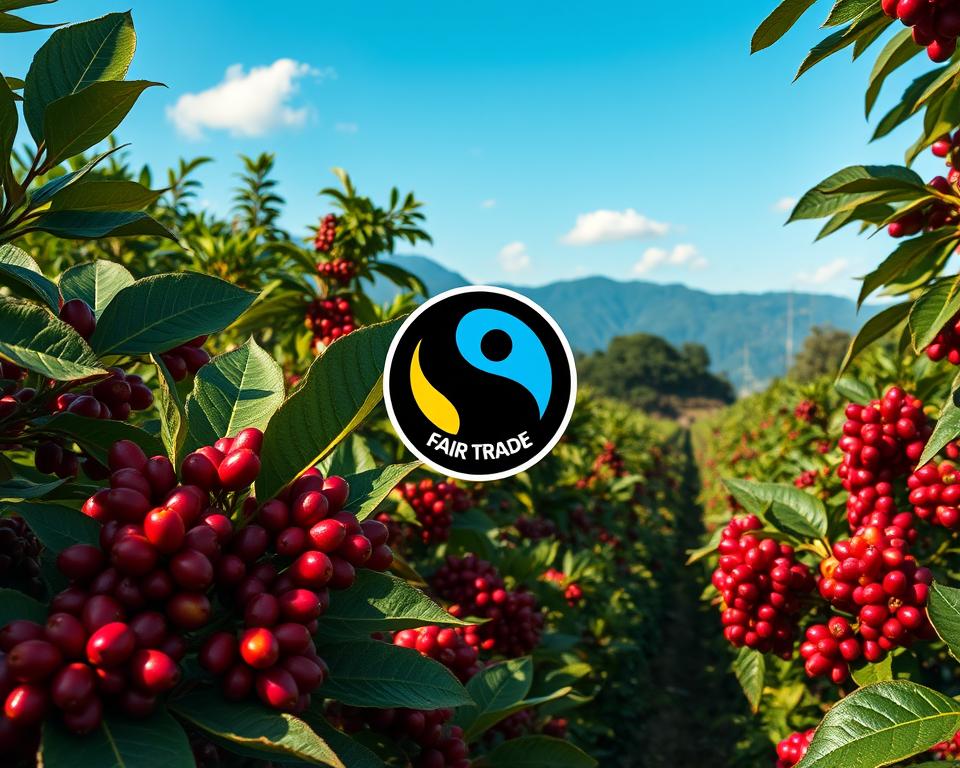
Guaranteed Fair Prices
Fair Trade means farmers receive set fair prices. These prices cover sustainable production costs. It acts as a financial safety net. You can discover more about Fair Trade coffee pricing on their official website. Fair prices not only provide a steady income for farmers but also motivate them to raise crop quality.
Community Development Projects
Fair Trade certification supports more than just fair pricing. It helps fund projects that improve education, healthcare, and infrastructure in coffee communities. These efforts bolster local economies and promote sustainability. By choosing ethical coffee, you aid in enhancing these communities.
Impact on Farming Communities
The effects of Fair Trade on farming communities are significant. Fair pay lets farmers better their farms and their towns. This positive cycle promotes economic and social growth. Fair Trade also values eco-friendly farming, preserving biodiversity. It enriches the lives of farmers and their regions.
Organic Certification: Growing Coffee Sustainably
Let’s talk about why organic coffee farming is so important. This type of farming does not use synthetic fertilizers or pesticides. It means we get a healthier choice that’s also better for our planet. By choosing organic, we support farming that takes care of the soil and helps the environment.
No Synthetic Fertilizers or Pesticides
Organic coffee is special because it grows through sustainable farming. Farmers use natural methods to keep the soil fertile and pests away. Such practices are key to avoiding chemicals, making coffee safer to enjoy. They also help the environment by reducing pollution and improving soil health. Artisan Coffee Co. is one roaster that offers a variety of organic coffees. This makes it easy for us to choose more sustainable coffee options.
Benefits for Soil Health and Environmental Impact
Choosing organic coffee helps more than just avoiding man-made stuff. It supports a way of farming that’s good for our planet. This way, the soil gets stronger and healthier through things like compost and crop rotation. And it’s not just the soil that benefits. These methods help keep our water clean and protect natural habitats. This is a big deal in the 50 countries growing coffee organically.
Organic coffee isn’t only good for the Earth. It’s often tastier and of higher quality, too. Specialty Coffee Association requires a score of 80 or higher for a specialty grade. The steps to get organic certification show a farmer’s commitment to both the planet and quality coffee. This effort means they can ask for better prices. Plus, this coffee is full of minerals good for us. With more people wanting organic coffee, it’s shaping a healthier market and planet. Check out this informative study on the plus sides of choosing organic coffee.
Rainforest Alliance Certification: Protecting Ecosystems
The Rainforest Alliance Certification helps protect natural ecosystems. It makes sure the coffee industry supports rainforest conservation and fair work conditions. Coffee farms with the green frog seal follow strict rules for being green and socially responsible.
Conserving Forests and Wildlife
At its core, the Rainforest Alliance cares deeply about saving forests and animals. This badge encourages smart use of land. It safeguards forests and improves places where wildlife live.
By asking farmers to plant more trees, it fights climate change and stops forests from being cut down. Independent checks make sure farms stick to these important rules. This supports the variety of life, healthy soil, and water saving.
Safe Working Conditions
Another key point of the Rainforest Alliance Certification is making sure workers are treated right. Farms have to be safe and fair for their employees. They need to deal with issues like child work, equal rights, and fair pay.
This push for good ethics helps small farmers and forest communities do better, helping them escape poverty. Studies confirm that workers at certified places have better protection and work conditions. This keeps them safe and healthy.
How Do Coffee Certifications Impact the Quality of Specialty Coffee?
Coffee certifications play a crucial role in enhancing the quality of specialty coffee. By adhering to strict standards, these certifications ensure that farmers implement sustainable practices, leading to superior flavor profiles. As consumers seek greater transparency, they can also discover the evolution of specialty coffee through these recognized quality benchmarks.
Coffee Certifications Explained: Fair Trade, Organic, and More
Coffee certifications are key for shoppers who care about ethics and sustainability. They include Fair Trade, USDA Organic, and Rainforest Alliance. These are crucial for the coffee industry’s ethical shift. Certified coffee brands guarantee things like fair pay for farmers and no harmful pesticides.
Fair Trade certification ensures fair wages, better market access, and community growth. This allows coffee farmers around the world to benefit from their work. Specialty coffee with Fair Trade certification is big in North America and Europe. It promotes economic fairness and community betterment. Fair Trade started in 1988 and has grown, highlighting economic equity in coffee.
USDA Organic certification means coffee grows without synthetic fertilizers and away from non-organic crops. This makes your coffee free from dangerous substances. It’s good for both your health and the planet. The organic coffee market is growing, especially in North America and Latin America, where organic production is a focus.
Rainforest Alliance certification deals with saving biodiversity and sustainable farming. But, only 30% of a certified farm’s coffee beans need to meet their standards. This makes it a more flexible certification. Still, it’s a popular choice in North America and Europe, showing its role in encouraging care for the environment.
Bird-Friendly certification has strict requirements, like having 40% of coffee plants in the shade and 12-meter high trees. The Smithsonian Migratory Bird Center developed this. It’s becoming popular, especially among those who care about the environment in North America and Europe.
The coffee industry is worth $400 billion worldwide, but less than 1% of that money goes to Africa, where many coffee farmers are. Certifications and direct trade can help more money go to farmers. This supports transparency and quality in coffee production. The industry is moving towards a future where ethics are central, giving consumers a meaningful, high-quality coffee experience.
FAQ
What are coffee certifications?
Coffee certifications are special labels on coffee. They tell you about the coffee’s farming and selling process. These labels show if the coffee is made in a way that’s good for the planet, people, and ensures fairness in pay.
Why do coffee certifications matter?
Certifications help people know where their coffee comes from and its effect on the world. It means a simple coffee choice can support good deeds. This encourages caring for the earth and fairness.
What are some common coffee certifications?
There are several known coffee certifications like Fair Trade, Organic, and Rainforest Alliance. Each focuses on different things. They look at fair pay, eco-friendly farming, and protecting nature.
How does Fair Trade certification support coffee farmers?
Fair Trade makes sure farmers get fair pay. This protects them from price drops. They also get extra money for community projects. This helps build things like schools and clinics.
What are the benefits of Organic certification?
Organic certification means growing coffee naturally, without harmful chemicals. It’s better for the earth. Often, farmers get more money for these beans.
How does Rainforest Alliance certification protect ecosystems?
Rainforest Alliance sets rules to shield wildlife and forests. Farms must handle waste well and keep workers safe. It’s about making coffee in a way that’s good for everyone and everything.
What does economic fairness mean in coffee certifications?
Economic fairness means making sure coffee farmers are paid well. This helps their communities grow and thrive. It’s about making the coffee industry fair for everyone.
How do certifications like Rainforest Alliance promote social responsibility?
Rainforest Alliance and similar certifications care about workers’ rights and safety. They combine caring for people with protecting the environment. It’s a full-circle approach to making coffee.
Can coffee certifications impact the quality of coffee?
Yes, certifications often point to both ethical practices and high-quality coffee. For instance, Organic certification may come with a quality score. This helps buyers find the best beans that are also made right.

